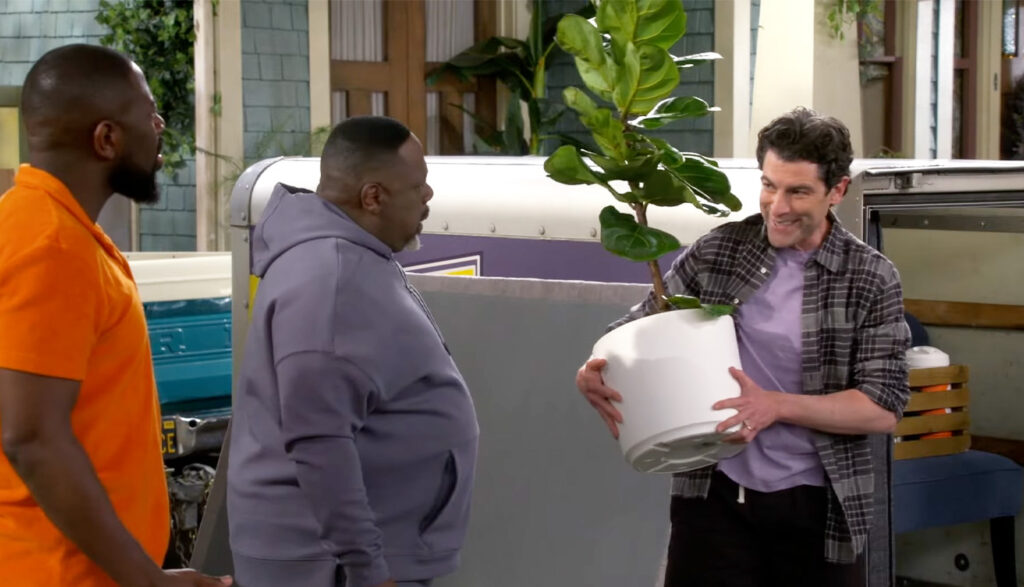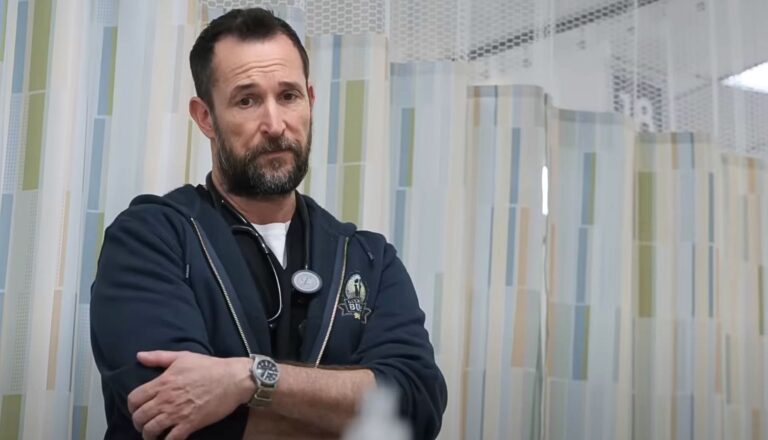
The Night Manager
Does it take a thief to catch a thief? Does it take lots of bad content to make a good TV show?

People don’t get to know their neighbors as well as they used to. Typically, we don’t chit-chat over the back fence or knock on the door asking for sugar. And that, my friends, is a shame.
‘Course, it could be worse. You could have Dave and Gemma Johnson living next door to you. And that might make you long for the days when neighborhood interactions were sequestered to a friendly wave.
It’s not that Dave and Gemma aren’t nice. In fact, they’re so nice that you’d think they came from an old Care Bear episode—or at the very least from Canada. And indeed, they used to live close to our neighbors to the north: Michigan, to be precise, and apparently the happiest, most friendly corner of the state that can be found.
Thing is, their new neighborhood in Los Angeles isn’t quite used to all that aggressive Midwestern congeniality.
Then, of course, there’s this: The Johnsons are white—as white as a couple can apparently be. The neighborhood they’re moving into is predominantly Black. Some residents look at the Johnsons’ moving truck and initially say, “Well, there goes the neighborhood.”
Calvin Butler was among those doubters at first. When the Johnsons moved in right next door, his wife, Tina, and sons Malcolm and Marty welcomed Dave and Gemma despite their strange ways. But Calvin wasn’t so sure about the pale presence across the property boundary. And frankly, he still has days when Dave’s relentless, chipper gregariousness rattles his nerves. Whole weeks, maybe.
But even Calvin must acknowledge that the Johnsons are good people and that they add something special to the neighborhood. And Dave and Gemma are slowly learning how to fit in a little better, too.
CBS’s The Neighborhood offers a newish twist on the age-old, fish-out-of-water sitcom, wherein someone moves into a neighborhood where they don’t quite belong. We saw it way back when with The Beverly Hillbillies, Green Acres, even The Munsters—all of which, interestingly enough, aired on CBS back in the day.
This CBS sitcom isn’t quite as original as those shows, trying to be both more conventional and more culturally relevant all at once. It gently pokes fun at our racial and cultural differences in a particularly sensitive time, drawing appropriate lessons where and when it can.
Still, to whatever degree The Neighborhood is relevant, it plays reasonably well with others. It feels, in fact, like a sitcom we might’ve seen 20 years ago, a mostly family-friendly offering from a bygone age. Language can be a bit of a problem. And there’s a rather casual approach to sex. (Marty has a baby with a woman named Courtney after a one-night stand, and the pair are still working out their co-parenting strategy and relationship status.)
The Neighborhood, like all neighborhoods, isn’t free from some problems. But it feels relatively safe—the sort of place where you could sit for a spell on the porch and drink a glass of lemonade. And that’s more than we can say for many a television neighborhood.
(Editor’s Note: Plugged In is rarely able to watch every episode of a given series for review. As such, there’s always a chance that you might see a problem that we didn’t. If you notice content that you feel should be included in our review, send us an email at letters@pluggedin.com, or contact us via Facebook or Instagram, and be sure to let us know the episode number, title and season so that we can check it out.)
Tina and Calvin struggle as first-time empty nesters after Malcolm moves across town. Meanwhile, Marty tries to convince Courtney to officially move in with him. Gemma worries about her teenage son having more freedom. And Dave embraces artificial intelligence a little too fully.
Courtney and Marty, who had a daughter after what was supposed to be a one-night stand, are now dating and mostly living together—though Courtney hesitates to make that more permanent. They kiss. Tina and Calvin salsa dance together. There are jokes about strippers and strip clubs.
Gemma and Dave track their son’s location on his phone, worried the teen will get into trouble if they don’t. Tina is disappointed when Malcolm cancels a dinner with his parents, and she throws out the food in anger. (She later blames Calvin for allowing her to do so.) Some characters lie. Someone loses his job to an AI agent.
Adults drink alcohol. We hear “a–,” “crap,” “d–n” and “h—.” God’s name is also misused.
Calvin helps Tina work through her empty-nest troubles but fails to address his own. After overstaying his welcome at Malcolm’s (he uses power tools to build shelves while Malcolm is trying to conduct a work call), Malcolm snaps at him. However, Malcolm later apologizes, and Calvin admits to Tina that he was also struggling. A woman wears a cross necklace.
Dave and Gemma invite Calvin and Tina over for Thanksgiving dinner, but then try to disinvite them when Dave learns that his older, small-town and embarrassingly outspoken mother is coming, too.
“Oh, she’s racist!” Tina confirms.
Not exactly, but she does assume that Tina and Calvin’s son Marty must’ve gone to college based on a sports scholarship, and she further assumes that Calvin must work at a rap radio station when she learns that he’s an engineer. She blurts out a number of other insensitive things, too, including calling Calvin a “grease monkey.” And when Calvin takes offense, she suggests that it’s because black people are “always so sensitive.”
But when Dave tells his mother how much she embarrasses him, Calvin tells Dave that he should be the one to apologize—to her. “She’s not gonna change,” Calvin says. “But she’s also not going to be around forever. And when she’s gone, I don’t care how much she embarrasses you. You’re gonna miss her like you never missed anybody before.”
Calvin toasts to friends and family before Thanksgiving dinner with a glass of wine. Dave serves mixed drinks even earlier to “get ahead” of the impending disaster; and when his mom starts talking, he mutters that he should’ve made the drinks stronger. Tina sips wine in the kitchen.
We hear lots of racial stereotypes uttered and repeated. Dave’s mother’s conservative leanings (including her choice of news networks) are ridiculed. Characters say “a–” and “d–n” twice each.

Paul Asay has been part of the Plugged In staff since 2007, watching and reviewing roughly 15 quintillion movies and television shows. He’s written for a number of other publications, too, including Time, The Washington Post and Christianity Today. The author of several books, Paul loves to find spirituality in unexpected places, including popular entertainment, and he loves all things superhero. His vices include James Bond films, Mountain Dew and terrible B-grade movies. He’s married, has two children and a neurotic dog, runs marathons on occasion and hopes to someday own his own tuxedo. Feel free to follow him on Twitter @AsayPaul.

Emily studied film and writing when she was in college. And when she isn’t being way too competitive while playing board games, she enjoys food, sleep, and geeking out with her husband indulging in their “nerdoms,” which is the collective fan cultures of everything they love, such as Star Wars, Star Trek, Stargate and Lord of the Rings.

Does it take a thief to catch a thief? Does it take lots of bad content to make a good TV show?

The Hunting Party is far from the most gruesome drama on television, but its disturbingly inventive ways of killing may make viewers a bit queasy.

Max’s hospital drama ‘The Pitt’ strives to be medically accurate. While a noble goal, this show comes with a whole lot of content, too.

Netflix’s ‘Seven Dials’ (and the Agatha Christie book it’s based on) is filled with peril and suspicion. And more death is coming.